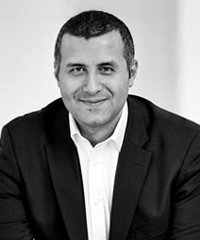‘Thinking big’ key to tech CEO Amr Shady’s success
At age 15 he was admitted at a Canadian university to study electrical engineering. By 23 he started his own business, and today, in his 30s, Amr Shady runs one of the 50 fastest-growing technology companies in Africa as ranked by professional services firm Deloitte. Dinfin Mulupi spoke to the entrepreneur via email about his motivations to venture into business, the lessons he has learned and his ambition to “build the next Google”.
You started Egypt-based TA Telecom in your 20s. What inspired you to venture out on your own?
I was a project manager in a family business, a very successful electro-mechanical company my father founded in the eighties. It was based out of Saudi Arabia and I was in charge of supervising the launch of the Cairo office and new projects the company landed in Egypt starting 1997. I did this job for three years, very exciting for me back then. I learned a lot about working with people and about management but I reached a ceiling.
I wanted something very innovative. After discussions with some friends, I decided to venture into the mobile industry. It was new and had groundbreaking potential. My father is an entrepreneur; I saw how he launched his own company. I was very happy to see him support me in making this decision, because it meant leaving the family business.
The first days were very exciting for me. We had very big dreams for the company. In retrospect, those dreams seem very small and very local compared to our dreams for TA Telecom now.
You operate in Africa and the Middle East. Describe your services. Who are your clients?
We have been building content platforms, analytic tools and brands for the past 15 years. We are trying to create products that engage mobile users, drive business success and optimise strategy for diverse stakeholders, including mobile operators, enterprises and NGOs.
We manage to generate 1.5 billion push alerts annually and process more than 840 million charging transactions on our mobile content platforms. We provide products that benefit more than 10 million users in the Middle East and Africa mobile market. The company is expanding vigorously in Egypt, Nigeria, South Africa, Kenya, Libya, the UAE, Saudi Arabia and Afghanistan.
What challenges have you faced?
I believe it is very important for any entrepreneur or business executive to constantly redefine what success means, to challenge yourself, set a higher bar, year on year. It’s about changing your expectations of yourself, your company and your teams.
Entrepreneurs running a business face different challenges at different stages. In the beginning, it is winning the first few customers. Then, as the company grows and people realise it’s not a small team anymore, a cultural shift sets in. As you grow bigger, as a founder you start focusing more on what’s next, away from the day-to-day operations to the bigger picture. But one challenge remains throughout all stages of any company, from start to growth and maturity. It is the challenge of making sure we have the right people on board. Do we have the right co-founders? The right employees? Is everyone contributing to the growth of the company? Are we retaining the right people, attracting the right people?
Tell us some lessons learned in your journey.
I learned not to self-censor, not to discount my potential, and not to think small. Entrepreneurs – myself included – are guilty of making the pre-Bannister mistake, namely the wide belief that athletes could not run a mile in less than four minutes which was once perceived as the human body’s physical limit. British athlete Roger Bannister broke the four-minute mile world record in 1954, encouraging more runners to succeed in breaking this psychological barrier. Entrepreneurs must think big, break barriers and stay positive in order to maximize their potential success.
Any words of advice to others like you in Africa?
Entrepreneurs must stay positive and acquire the knowledge to take their good ideas to market and grow their companies successfully. I also advise them to think big, to take their ideas to the regional and global levels. African entrepreneurs should be tenacious in the pursuit of opportunities and to bring their ideas to life.
Lastly, what does the future hold for TA Telecom? What are your growth plans?
We are focusing on executing the plan we’ve developed and been fine-tuning since 2011, which entails strong growth in Africa. We are committed to our expansion in the African market. The world is now increasingly smaller and increasingly competitive. We are looking to create products that can compete on a global level. Along these lines, we’ve spun off one of our latest products in Silicon Valley. We are trying to prove that an African company can compete on the global level, and somewhere as technically aggressive as Silicon Valley. We hope that this move will inspire other African companies to follow suit. If TA Telecom does not build the next Google, it will either invest in it, or inspire it to happen.


